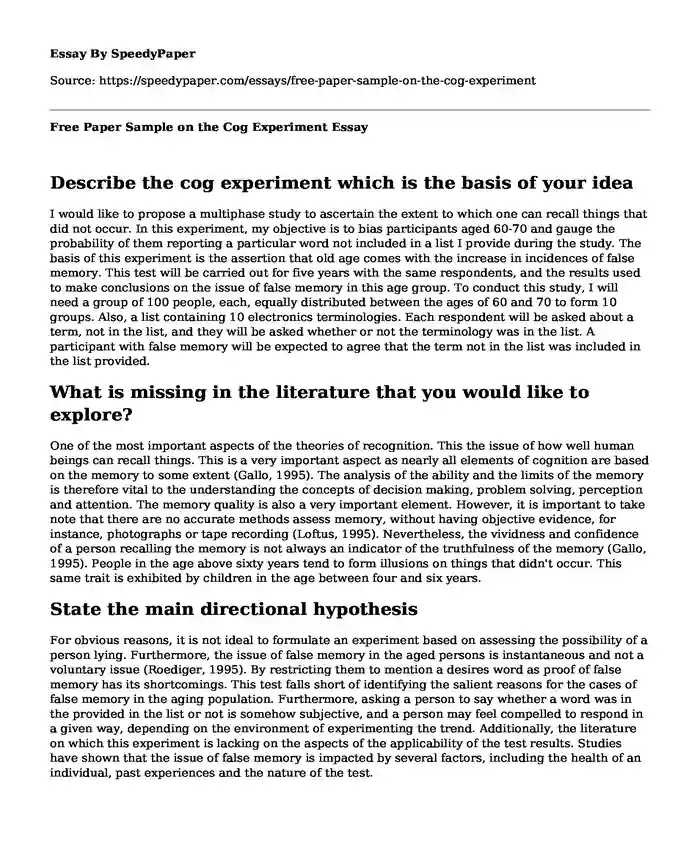
| Type of paper: | Research proposal |
| Categories: | Healthcare |
| Pages: | 4 |
| Wordcount: | 838 words |
Describe the cog experiment which is the basis of your idea
I would like to propose a multiphase study to ascertain the extent to which one can recall things that did not occur. In this experiment, my objective is to bias participants aged 60-70 and gauge the probability of them reporting a particular word not included in a list I provide during the study. The basis of this experiment is the assertion that old age comes with the increase in incidences of false memory. This test will be carried out for five years with the same respondents, and the results used to make conclusions on the issue of false memory in this age group. To conduct this study, I will need a group of 100 people, each, equally distributed between the ages of 60 and 70 to form 10 groups. Also, a list containing 10 electronics terminologies. Each respondent will be asked about a term, not in the list, and they will be asked whether or not the terminology was in the list. A participant with false memory will be expected to agree that the term not in the list was included in the list provided.
What is missing in the literature that you would like to explore?
One of the most important aspects of the theories of recognition. This the issue of how well human beings can recall things. This is a very important aspect as nearly all elements of cognition are based on the memory to some extent (Gallo, 1995). The analysis of the ability and the limits of the memory is therefore vital to the understanding the concepts of decision making, problem solving, perception and attention. The memory quality is also a very important element. However, it is important to take note that there are no accurate methods assess memory, without having objective evidence, for instance, photographs or tape recording (Loftus, 1995). Nevertheless, the vividness and confidence of a person recalling the memory is not always an indicator of the truthfulness of the memory (Gallo, 1995). People in the age above sixty years tend to form illusions on things that didn't occur. This same trait is exhibited by children in the age between four and six years.
State the main directional hypothesis
For obvious reasons, it is not ideal to formulate an experiment based on assessing the possibility of a person lying. Furthermore, the issue of false memory in the aged persons is instantaneous and not a voluntary issue (Roediger, 1995). By restricting them to mention a desires word as proof of false memory has its shortcomings. This test falls short of identifying the salient reasons for the cases of false memory in the aging population. Furthermore, asking a person to say whether a word was in the provided in the list or not is somehow subjective, and a person may feel compelled to respond in a given way, depending on the environment of experimenting the trend. Additionally, the literature on which this experiment is lacking on the aspects of the applicability of the test results. Studies have shown that the issue of false memory is impacted by several factors, including the health of an individual, past experiences and the nature of the test.
Describe the theory that motivates your question
From the results of the study, it was evident that 45% of the participants tested positive for false memory. The respondents aged over 68 years had a more prevalence in testing positive for false memory. This confirms hypothetical assertions that false memory increases with the advancement in age.
If false memory is a factor of age, then there would have to be underlying reasons behind this trend. The functioning of the brain should have some correlation with the advancement with age, though with some exceptions as some aged people in the test had no incidences of false memory at all(Zaragoza, 1996).
Describe the independent variable(s) that you are adding to the cog lab report
An addition to the variables in the cog lab experiment would be the conditions in which the test is carried out. This is because making the environment more restrictive can give different result as the feeling of being compelled to give a particular answer can give different results.
In conclusion, false memory is a psychological problem that affects children, the aged or people undergoing some difficulties. It is, however, important that psychologists do not completely ignore what is termed as false memory as it may point to a real occurrence experienced previously.
List the references to be used in your lab four paper.
Gallo, D. A., Roberts, M. J., & Seamon, J. G. (1997). Remembering words not presented In lists: Can we avoid creating false memories? Psychonomic Bulletin & Review, 4(2), 271-276.
Loftus, E. F., & Pickrell, J. E. (1995). The formation of false memories. Psychiatric annals, 25(12), 720-725.
Roediger, H. L., & McDermott, K. B. (1995). Creating false memories: Remembering Words not presented in lists. Journal of experimental psychology: Learning, Memory, and Cognition, 21(4), 803.
Zaragoza, M. S., & Mitchell, K. J. (1996). Repeated exposure to suggestion and the Creation of false memories. Psychological Science, 7(5), 294-300.
Cite this page
Free Paper Sample on the Cog Experiment. (2022, Jun 03). Retrieved from https://speedypaper.net/essays/free-paper-sample-on-the-cog-experiment
Request Removal
If you are the original author of this essay and no longer wish to have it published on the SpeedyPaper website, please click below to request its removal:
- How Does Language Affect Culture, Essay Example for Modern Students
- Book Analysis Essay Example: Eichmann in Jerusalem
- Fear and Loathing of the English Passive, Free Essay for Students
- Wisconsin Card Sorting Test, Case Study Example
- Essay Sample on Sport Participation Among Racial and Ethnic Minorities
- Essay Sample on A Career Path in Risk Management
- Health Informatics: Future of Healthcare Delivery - Essay Sample
Popular categories




